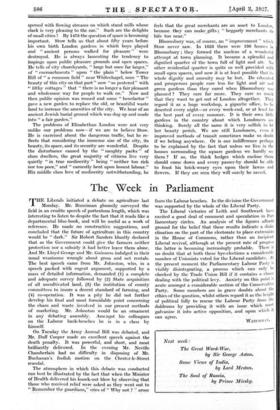The Week in Parliament T HE Liberals initiated a debate on
agriculture last Monday. Mr. Runciman gloomily surveyed the field in an erudite speech of portentous length, which was interesting to listen to despite the fact that it reads like a departmental blue-book, and will be useful as a work of reference. He made no constructive suggestions, and concluded that the future of agriculture in this country would be " dark." Sir Robert Sanders bluntly declared that as the Government could give the farmers neither protection nor a subsidy it had better leave them alone. And Mr. Lloyd George and Mr. Guinness indulged in their usual wearisome wrangle about gross and net rentals. The best speech came from Mr. Johnston, who, in a speech packed with cogent argument, supported by a mass of detailed information, demanded (1) a complete and adequate survey followed by (2) State acquisition of all uncultivated land, (3) the institution of county Committees to insure a decent standard of farming, and (4) co-operation. It was a pity he did not further develop his final and most formidable point concerning the chaos and waste involved in our present methods Of marketing. Mr. Johnston would be an ornament in any debating assembly. Amcng,st his colleagues on the Labour back-benches he is in a class by himself.
On Tuesday the Army An nual Bill was debated, and Mr. Duff Cooper made an excellent speech against the death penalty. It was powerful, and short, and most brilliantly delivered. In the evening Mr. Neville Chamberlain had no difficulty in disposing of Mr. Buchanan's foolish motion on the Chester-le-Street scandal.
The atmosphere in which this debate was conducted can best be ilhistrated by the fact that when the Minister of Health delivered his knock-out blow by observing that those who received relief were asked as they went out to " Remeniber the guardians " cries of " Why not ? " arose from the Labour benches. In the division the Government was supported by the whole of the Liberal Party.
The Liberal victories of Leith and Southwark have excited a good deal of comment and speculation in Par- liamentary circles. An analysis of the - figures affords ground for the belief that these results indicate a disin- clination on the part of the electorate to place extremists in the House of Commons, rather than an incipient Liberal revival, although at the present rate of progress the latter is becoming increasingly probable. There is no doubt that at both these bye-elections a considerable number of Unionists voted for the Liberal candidate. At the present moment the Parliamentary Labour Party is visibly disintegrating, a process which can only he checked by the Trade -Union Bill if it contains a clause dealing with the political levy. Anxiety on this point is acute amongst a considerable section of the Conservative Party. Some members are in grave doubts about the ethics of the question, whilst others regard it as the height of political folly to rescue the Labour- Party from the doldrums by providing it • with an issue- which must galvanize it into active opposition, and upon which it can agree. WATCHMAN.


















































 Previous page
Previous page